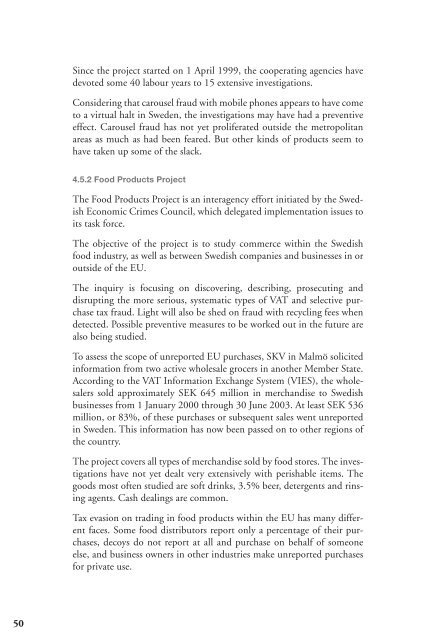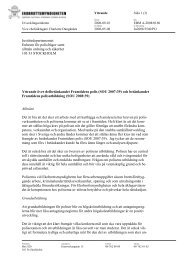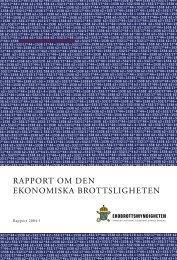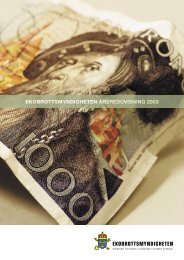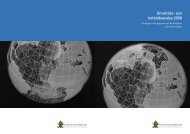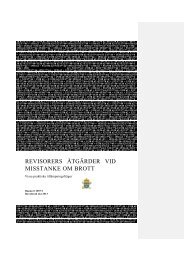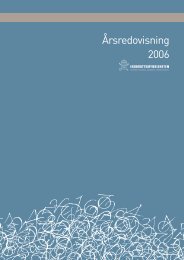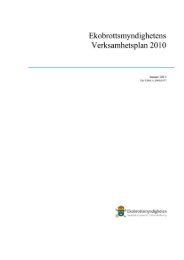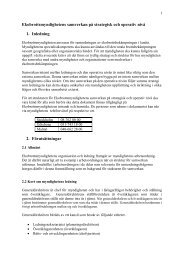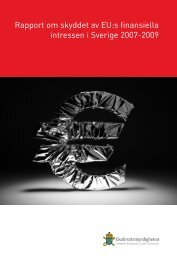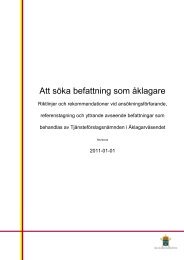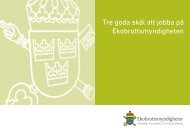Economic crime report 2004 - Ekobrottsmyndigheten
Economic crime report 2004 - Ekobrottsmyndigheten
Economic crime report 2004 - Ekobrottsmyndigheten
You also want an ePaper? Increase the reach of your titles
YUMPU automatically turns print PDFs into web optimized ePapers that Google loves.
Since the project started on 1 April 1999, the cooperating agencies have<br />
devoted some 40 labour years to 15 extensive investigations.<br />
Considering that carousel fraud with mobile phones appears to have come<br />
to a virtual halt in Sweden, the investigations may have had a preventive<br />
effect. Carousel fraud has not yet proliferated outside the metropolitan<br />
areas as much as had been feared. But other kinds of products seem to<br />
have taken up some of the slack.<br />
4.5.2 Food Products Project<br />
The Food Products Project is an interagency effort initiated by the Swedish<br />
<strong>Economic</strong> Crimes Council, which delegated implementation issues to<br />
its task force.<br />
The objective of the project is to study commerce within the Swedish<br />
food industry, as well as between Swedish companies and businesses in or<br />
outside of the EU.<br />
The inquiry is focusing on discovering, describing, prosecuting and<br />
disrupting the more serious, systematic types of VAT and selective purchase<br />
tax fraud. Light will also be shed on fraud with recycling fees when<br />
detected. Possible preventive measures to be worked out in the future are<br />
also being studied.<br />
To assess the scope of un<strong>report</strong>ed EU purchases, SKV in Malmö solicited<br />
information from two active wholesale grocers in another Member State.<br />
According to the VAT Information Exchange System (VIES), the wholesalers<br />
sold approximately SEK 645 million in merchandise to Swedish<br />
businesses from 1 January 2000 through 30 June 2003. At least SEK 536<br />
million, or 83%, of these purchases or subsequent sales went un<strong>report</strong>ed<br />
in Sweden. This information has now been passed on to other regions of<br />
the country.<br />
The project covers all types of merchandise sold by food stores. The investigations<br />
have not yet dealt very extensively with perishable items. The<br />
goods most often studied are soft drinks, 3.5% beer, detergents and rinsing<br />
agents. Cash dealings are common.<br />
Tax evasion on trading in food products within the EU has many different<br />
faces. Some food distributors <strong>report</strong> only a percentage of their purchases,<br />
decoys do not <strong>report</strong> at all and purchase on behalf of someone<br />
else, and business owners in other industries make un<strong>report</strong>ed purchases<br />
for private use.<br />
50


